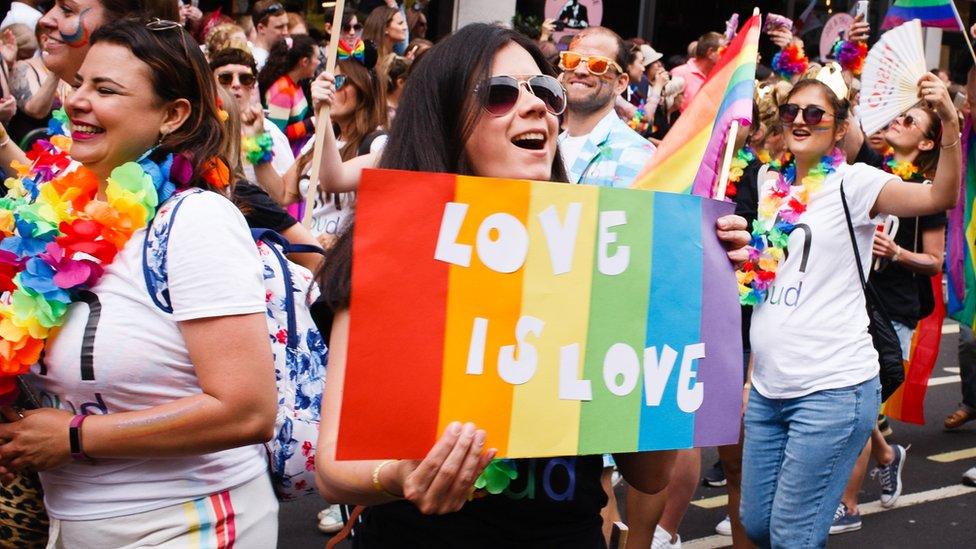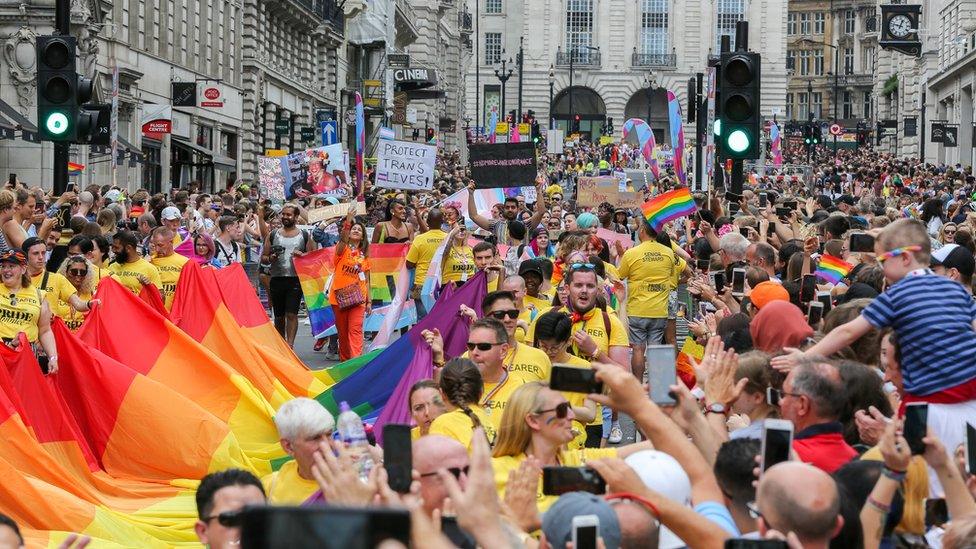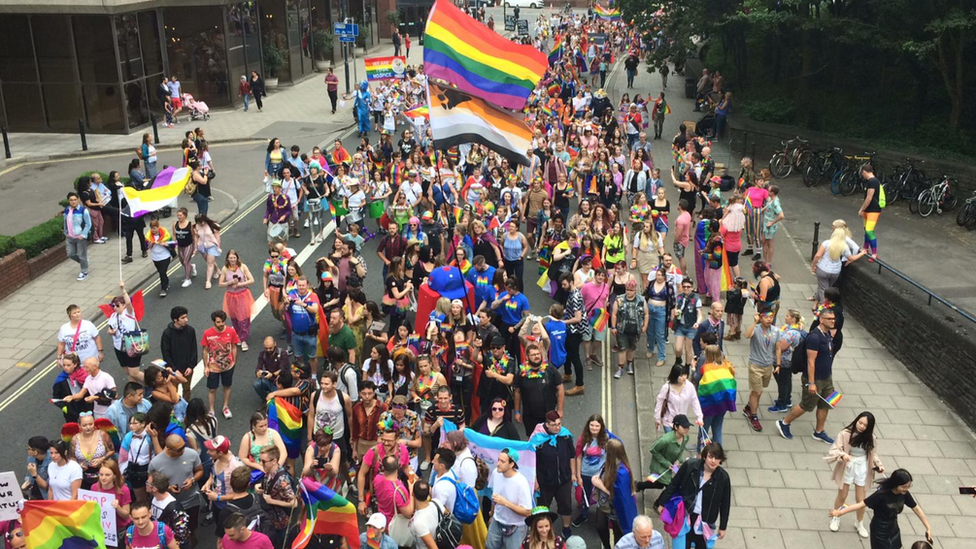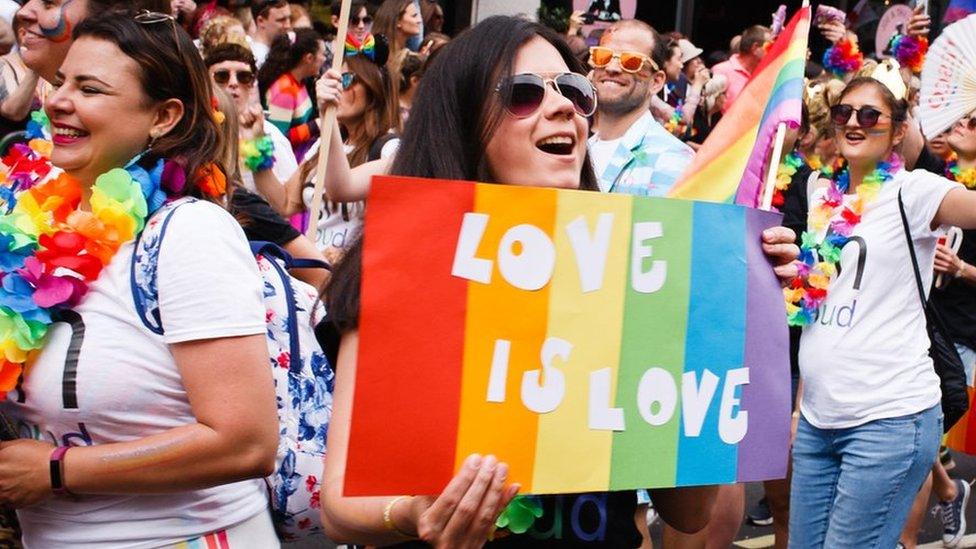Pride 2021: 'It's about coming together and being seen'
- Published

Members and supporters of the LGBT community taking part in the 2019 Pride parade in London
Pride is usually celebrated with big parades, parties and marches but, with the ongoing coronavirus pandemic, things have been a little different.
The first of this year's Prides were due to take place while the country was still in lockdown.
As a result of the pandemic, some cities cancelled their parades, some their festivals, and some decided it was best to call the whole thing off and start again next year.
Others - such as Nottinghamshire Pride - have been able to go ahead, albeit in a reduced form.

Nottingham's Pride focused on the march rather than the festival
Leigh Ellis, chair of Nottinghamshire Pride, said: "This weekend we should have had a 10m (32ft) stage with lasers and had Heather Small singing 'Proud'.
"But we'd have had to have brought in a ticketing system and managed numbers. And that's just not what we're about."

Mr Ellis said seeing the Pride march happen again was 'moving'
Instead this year there will only be a Pride parade.
"People have a right to march," he said. "And through social media, [we] began to feel it was important to people to be seen and to have the opportunity to march."
Organisers estimate more than 10,000 people flocked to the city centre to take part in the event - more than they were expecting and about the same size as a usual year.
One of them was Laurel, 13, who was attending her first Pride with her mum Tamsin.
She said: "It's really great, I can express myself. I'm just happy to be here."
Her mum added: "It's fantastic to see so many different expressions of people, it's really exciting."

It was the first Pride march either mother or daughter had ever attended
Karim Yala, 28, said: "It's an honour to be finally back after everything that has happened."

Tim (left) and Karim (right) said they enjoyed seeing the community coming together again
The event was delayed from its usual date at the end of July and instead took place on Saturday.
Restrictions on large-scale events ended in July, but organisers still have to work with local authorities and their public health teams to manage the risk.

Manchester focused on the festival element of the event and cancelled their usual parade
Pride marches are free to attend and not ticketed in the same way as a music festival or football match are, making the risks more difficult to manage.
"We've not been seen since 2019 and in that time a lot has changed," said Leigh.
"Our aim, ambition, what we stand for, is visibility. It's about our LGBT+ community coming together and being seen."

London Pride is the UK's largest
Elsewhere, the cancellation of events that did not go ahead for the second year in a row caused much disappointment.
London, Leeds, Liverpool, Brighton and Bristol's Pride parades and main events were all called off over Covid concerns.

Analysis
It's more than 50 years since the first Pride March took place in New York, in a follow-up to the Stonewall riots that saw LGBT people rise up in the face of relentless discrimination.
When half a dozen police officers raided a Mafia-run gay bar on a hot New York night 50 years ago, little did they know their actions would spark a movement that reshaped the lives of generations.
In many places - including the UK - LGBT rights have progressed hugely over the following decades and Pride events offer attendees a chance to acknowledge and celebrate just how far things have come.
But the work is far from over and LGBT people often face everything from worse health outcomes, to feeling unable to be open about their identity to their colleagues.
While Pride events are often joyful, gathering in this way is also a political statement and a public declaration by a community who historically have had to hide who they are - and in many countries still do today.
While having to scale down or cancel these public events has been a blow, Pride is more than a day or even a month - it's a movement that will take more than a pandemic to kill off.
Eleanor Lawrie, LGBT Producer for the BBC

Organisers said London Pride - the biggest in the country and attended by more than 1.5m people in 2019 - had to be cancelled because it "became clear" that they could not mitigate the risks without dropping the parade and cutting back the size of the event.
Executive director Chris Joell-Deshields said at the time: "This goes against everything we want Pride in London to be or that we have been so far. No parade, no protest, means no Pride."

Bristol's 2019 Pride Day saw thousands of people parade through the city centre
Bristol's Pride Day and parade, scheduled for July, were also cancelled amid rising case rates and a delayed national unlocking.
Eve Russell, festival director, said: "To put further limitations in place, particularly for the march, means it is not open to everyone when it should be.
"Pride is about a community and people who are excluded.
"We don't want to make it an event that increases the divide and makes more people from our own community excluded."

London Pride was cancelled but Trans Pride still took place in the capital
Of course, Pride is about more than just the official events.
Even in those cities where the full Pride event was called off, smaller parties at LGBT venues took place, with or without the backing of the Pride organisers.

Oxford's online Pride involved a day of interviews and performances from stars such as Sum Ting Wong streamed online
However, some Pride events - such as that in Oxford - took place online.
Chair Debbie Brixey said: "Having some sort of event where you can see people like yourself is very, very important.
"Going online gives people who would not be able to attend normally the chance to join."
She added she hoped the digital presence would continue in future.
Sasha Misra, from the charity Stonewall, said: "It has been inspiring to see the visible shows of support that LGBTQ+ people have provided one another in such a challenging year.
"Ultimately, whether it's in-person or virtual, Pride is about coming together - in our communities, in our schools, workplaces, streets and increasingly online - to celebrate who we are, celebrate how far we've come, and fight for the freedom, equity and potential of every single one of us."

Follow BBC East Midlands on Facebook, external, on Twitter, external, or on Instagram, external. Send your story ideas to eastmidsnews@bbc.co.uk, external.
Related topics
- Published6 August 2021

- Published17 June 2021
